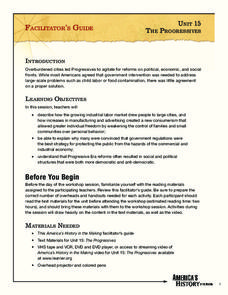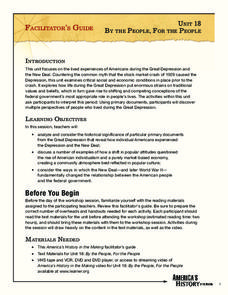Curated OER
The Iceberg
Students consider Mongolian and American cultural features. In this global studies lesson, students compare an iceberg to cultural features as they brainstorm and discuss visible and invisible cultural features.
Curated OER
Representation: Elections
Students study and examine how elections are conducted in Australia. In this representation lesson plan, students make comparisons regarding systems of voting. Students explore the three levels of government and discuss federal...
Curated OER
3 Branches of Our Government
This straightforward fill-in-the-blank activity could be used for a variety of purposes. Young historians are given 10 sentences about the branches of government; they fill in the blanks with terminology that is related to the United...
Curated OER
When I Was Young In Appalachia
Young scholars comapre and contrast the lifestyles of the people of the Applachian region with their own community through in-class discussions, creative projects, hands-on activities, food preservation, homemade remedies, home...
Curated OER
Loyalists and Loyalism in the American Revolution
Students engage in activities to understand how ideologies were constructed before and during the Revolutionary War. How and why were some "reluctant revolutionaries" turned into whig patriots willing to fight against the British empire,...
Curated OER
Sir Francis Drake
Help your learners prep for an exam testing content knowledge related to Florida's State History. Your class can use this printable page to review vocabulary, identify locations on a map, and research both knights and the Sir Francis...
Curated OER
It's Happening Where: Graphic Organizer #1 for Newspaper Articles
Planning a newspaper or journalism unit? Use these graphic organizer to help your young reporters organizer their articles. The first page instructs users to plan out the structure of their article, while the second page prompts them to...
Curated OER
Do You Really Need It?
A large part of understanding personal finance and economics is grasping the concept of wants and needs. This presentation provides students with basic yet effective definitions of wants, needs, and how they effect advertisements and...
Judicial Branch of California
A “Commemorative” Bill of Rights
It's 1943, and Jewish people in Denmark are in hiding from the Nazis. What protection can the United States offer them? By examining the Constitution, specifically the Bill of Rights, scholars consider the protections afforded to those...
Curated OER
Buy Nothing Day
Students discover Buy Nothing Day. In this consumer awareness lesson plan, students discuss their spending habits and consider the effects of mass consumerism. Students discuss alternative activities to shopping on Buy Nothing Day.
Rainforest Alliance
Forests of Guatemala
With 90 percent of its land area covered in forests, Suriname, a country in South America, contains the largest percentage of forests throughout the world. Here is an activity that brings classmates together to learn about the...
Museum of Tolerance
Immigration Journeys
Through the journey of four stories of immigration, scholars complete graphic organizers and apply knowledge to create a visual representation of their findings on a large poster. Third and fourth readers write a letter to their...
Museum of Tolerance
Citizenship Then and Now: Comparing Ancient Rome and Contemporary American Society
Class members research citizenship in Ancient Rome and in the United States and use the provided graphic organizers to compare the rights and responsibilities of citizens in these two democracies.
Broadway GPS
ALADDIN: Broadway's New Musical Comedy
Aladdin, Disney's Broadway musical comedy, is a magic carpet ride. Prepare your class for a field trip to the show with a study guide that is a treasure trove of activities, cultural connections, and background information.
Media Smarts
The Broadcast Project
As part of a unit on media studies, kids are asked to chart their viewing habits, observe the advertising that sponsors their favorite shows, and then to imagine what they would broadcast if given a block of airtime.
Curated OER
The True Confessions of Charlotte Doyle: KWHL
After completing the 11th chapter of The True Confessions of Charlotte Doyle by Avi, take part in a KWHL chart driven by the question,When is it appropriate and admirable to defy authority? Focusing on codes of conduct,...
Stanford University
Lesson Plan: Montgomery Bus Boycott
Most of us have heard of Rosa Parks, the Montgomery Bus Boycott, and Martin Luther King, Jr. But what about Claudette Colvin, Virginia Durr, Freedom Summer, or the Birmingham Children's Crusade? A five-instructional activity...
Annenberg Foundation
The Progressives
The Progressive Era brought about a word that often leads to turmoil—change! Learners research the late 1800s in American history to uncover societal issues gripping the nation back in the day. The 15th lesson of a 22-part series...
Annenberg Foundation
Taming the American West
Have you ever seen a movie about the romance of the American West with its buffalo, horses, cowboys, and endless frontier? The 13th installment of a 22-part series on American history presents the myths associated with the American West....
Annenberg Foundation
By the People, For the People
A picture speaks a thousand words—no matter how old. The 18th installment of a 22-part series on the making of American history has scholars research the causes of the Great Depression and the factors of the New Deal. Using photographic...
Curated OER
1704 Attack on Deerfield
Class groups examine conflicting primary and secondary sources describing the 1704 attack on the fort at Deerfield by French and Native Americans and analyze the implications of discrepancies.
Smithsonian Institution
Barn Again! Celebrating an American Icon
How do barns serve as a window to a community's past? Here are a series of lessons on the symbolism and historical context of barns throughout American history. Topics include community-building, in-depth primary and secondary...
Roy Rosenzweig Center for History and New Media
War and Poetry
A band of brothers or the Devil's agents? Nobel warriors freeing the oppressed or mercenaries working for the military/industrial complex? Groups examine poems from the Civil War, World War I, and World War II to determine the poets'...
Core Knowledge Foundation
Isn’t It Exciting? (The American Industrial Revolution and Urbanization)
America was built on the ingenuity, work ethic, and foresight of our ancestors. Sixth graders learn about the complex Gilded Age in American history, including the prominent inventors and captains of industry, and how they all connect...























